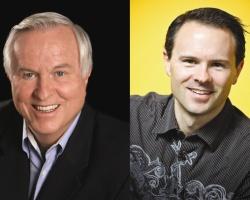Josh McDowell has been writing and speaking to young people about faith in Christ for nearly half a century. His son, Sean, pursues a similar calling. Together they have revised the best-selling resource, More than a Carpenter. What do these two leaders from two generations think about recent changes in youth culture? Here’s what they told us.
YouthWorker Journal: What are some of the key changes you see occurring in youth culture today, and how would you advise youth workers to address these changes in their work?
Josh McDowell: I see three key changes in youth culture. One, the cultural rejection of Christianity is [happening at] younger and younger ages. We currently are seeing many young people walk away from their faith after high school graduation. The next great exodus from the faith will be believers 11-12 years old. The critical point for reaching a young person used to be 18 years old. Now, it’s 13. If we don’t reach a student by 13, there is only a 4 percent chance we will reach him or her at all.
Because of the Internet, preteens now are being challenged in their faith in ways that only college students used to be. This is primarily because of the unfiltered nature of the Internet. Few students this age have the training or ability to evaluate these skeptical objections to their faith.
Next, we also are seeing more young people who are hurt and abandoned, not having significant relationships with healthy adults. There is a considerable [connection] between belief and relationships, so many of these kids are at a tremendous disadvantage of not being able to relate to God properly.
Third, there is a cultural shift from truth being viewed as objective to being viewed as personal. That is, young people tend to think truth is created rather than discovered. To reach this culture we need an “apologetic for apologetics.” As Timothy Keller has observed, we need an apologetic for truth.
My suggestion for youth pastors is to take half of their budget and put it into fourth- through seventh-grade ministries, training kids to be healthy emotionally and to think critically about their faith. It’s critical to find a balance between relationships and substance. Both are needed. Youth workers also might consider assigning a healthy adult couple to six or eight kids in order to model for them a healthy, happy and fulfilled marriage or other type of mature relationship.
Sean McDowell: Youth today are bombarded with information. The typical young person spends 27-33 hours per week using digital technology—texting, watching TV and movies, gaming and social networking. Information overload affects a person’s capacity for discernment, as Mark Bauerlein demonstrates in The Dumbest Generation. This generation has unlimited access to information but little wisdom or perspective.
The Internet also has affected how young people feel about the world. Because of the speed of communication, youth believe they can have what they want, when they want it, how they want it, wherever they want it. When there is little left to see or do, what is there to look forward to? Many young people are asking, “What is worth living for?” I believe this is one major reason why surveys pick up on high levels of loneliness, distrust and purposelessness among youth.
There are two important steps to help young people process information overload. First, help youth build a biblical worldview so they can recognize truth clearly amid the cacophony of messages. My experience is that this is best done in conversation, interaction and real-life settings. Second, we need to invest personally in the lives of young people so we have the platform to teach the biblical narrative authentically.
YWJ: What changes do you see occurring in youth ministry on the church, parachurch and college levels?
Sean: More and more youth workers are waking up to the need for substance. The question is whether they really can bring the needed depth. It’s thrilling to see the number of worldview and apologetics resources that have sprung up over the past three or four years. There’s been an explosion of books, Web sites, conferences and resources for youth leaders to help students come to grips with what they believe and why they believe it. This is a healthy trend.
Josh: There is a significant focus in ministry to guide young people into an individualized faith. Instead of guiding young people into the corporate faith of Christianity, many emphasize an eclectic faith that is focused on the self. This is consistent with the larger cultural focus on the self. In some ways this is the ultimate me-focused generation, as Jean Twenge pointed out in Generation Me. This generation has little sense of duty to anything beyond the self.
YWJ: Have you seen anything in youth ministry lately that excites you or makes you think, “These folks know what they’re doing”?
Josh: Dare2Share is one of the youth ministries I get most excited about. They not only help youth pastors be in a position to help students, but train young people to defend what they believe, as well. There is very little of this going on today.
Sean: Brett Kunkle of Stand to Reason recently started taking students on apologetics mission trips. For the past two years, we have partnered with him to take our youth to Berkeley to interview students on campus, interact with a student-atheist group and hear lectures from local atheists and agnostics. We taught our students how to recognize faulty thinking, ask good questions and most importantly how to love people who see the world very differently than we do. In 15 years of youth ministry, I never have seen a more challenging, engaging and fruitful form of discipleship.
YWJ: What is one issue that divided you two, either as father and son or as men of different generations; and how did you address it?
Sean: One of the things I treasure most about my relationship with my dad is that we can talk about anything. Even though my dad’s ministry began in a very different era—the radical 60s—he has worked tremendously hard to remain relevant today, even with our rapidly changing culture.
Generational differences often can be overrated. I guess if I had to pick something we disagree on, it probably would be the interaction between media and culture. He thinks media primarily reflects culture, whereas I think it largely influences culture. In reality, there’s probably truth in both.
YWJ: Looking into the future, what things make you hopeful about Christianity’s future prospects? What things concern you?
Sean: In the 1960s, Time magazine had a cover story titled, “Is God Dead?” As the title suggested, it widely was believed that Western culture was becoming irreversibly secular.
Recently, however, Christianity Today featured a cover story by philosopher William Lane Craig titled, “God Is Not Dead Yet.” Craig showed how during the past 40 years there has been a quiet revolution in Christian philosophy. Surprisingly, many atheists have admitted that Christianity is winning the intellectual battle.
One of the reasons the New Atheists have been so loud and hostile to the Christian faith is because they are losing the rational higher ground. In the next few decades, we hope we will see a significant number of Christian philosophers move into areas of influence in the university and penetrate culture from the top down.
YWJ: Josh, your first book was published in 1971. Do you think there still will be such a thing as books in the coming decades? How will changes in publishing change the way young people grow in their faith and/or receive and process information?
Josh: Honestly, I don’t think anyone really knows what is in store for the future of publishing; it’s a tossup. More and more books certainly will go digital, and we will see shorter books with shorter chapters.
YWJ: Josh, your Evidence that Demands a Verdict focused on reason and apologetics. Some people say that approach is not as relevant or as meaningful today. What do you think? Did Evidence put too much emphasis on rationality? Do some Christians today stress rationality too little?
Josh: I always have disagreed with most apologists because no one can reason their way to God. As I put in Evidence that Demands a Verdict and my other writings, the best defense of Christianity is a clear and simple presentation of the truth backed up by a lifestyle in the power of the Holy Spirit. None of the evidence brought me to Christ. It simply convinced me that it was true. What brought me to Christ was the love of God — when I realized that if I were the only person alive, Christ would have died for me.
The key to how much we stress rationality is always balance. As
YWJ: Sean, you grew up with a famous Christian author and celebrity for a dad. What would you say to pastors’ kids who struggle to live up to parents’ or others’ expectations?
Sean: I don’t want to be the next Josh McDowell, but the first Sean McDowell (whatever that means)! My desire is to use the gifts and abilities God has given me for His Kingdom, regardless of how that compares to my dad’s ministry. If I try to do ministry exactly like my father does, I will burn out. God has wired each of us uniquely. Sometimes I learned that [lesson] the hard way.
Personally, the best advice I got was from Bart Campolo. He told me to take a year after college graduation and work in the inner city where I could be pushed out of my comfort zone and learn to serve genuinely. It was one of the best experiences of my life! Many people get put into leadership positions before they are ready. Be willing to serve wholeheartedly, do your homework and wait on God’s timing rather than forcing the issue.
Josh McDowell is a veteran author and speaker who served with Campus Crusade for Christ. Since 1964, Josh McDowell Ministry has offered evidence for the God “who is passionate about a personal relationship with each person.”
Sean McDowell is the author of five books and is head of the Bible Department at Capistrano Valley Christian Schools in San Juan Capistrano, Calif., where he teaches apologetics and theology. Sean has a double Master’s degree from Talbot Theological Seminary in theology and philosophy. He and his wife, Stephanie, have two children.
 Josh and Sean’s latest collaboration is a new-and-improved version of More than a Carpenter, which has more than 15 million copies in print. This month, Tyndale releases a DVD-based campaign kit that Josh and Sean are hoping churches will select between now and Easter for church outreach and evangelism events (Tyndale.com).
Josh and Sean’s latest collaboration is a new-and-improved version of More than a Carpenter, which has more than 15 million copies in print. This month, Tyndale releases a DVD-based campaign kit that Josh and Sean are hoping churches will select between now and Easter for church outreach and evangelism events (Tyndale.com).




